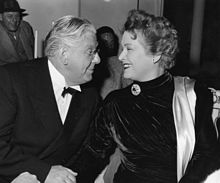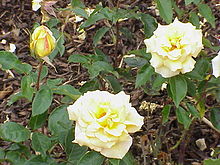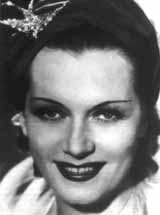Olga Chekhova
Olga Konstantinovna Tschechowa ( Russian Ольга Константиновна Чехова ., Scientific transliteration Ol'ga Konstantinovna Čechova ; originally Olga Knipper of ; born April 14 . Jul / 26. April 1897 greg. In Alexandropol, Russian Empire , now Gyumri , Armenia , † 9th March 1980 in Munich ) was a German actress of Russian-German origin.
Life
She was born in Russia into a German-speaking family that originally came from Saarbrücken . Her father was an engineer and made it up to the imperial railroad minister. Her younger brother was the composer Lev Konstantinowitsch Knipper . Her aunt, the actress Olga Knipper-Chekhova , was married to the Russian playwright Anton Chekhov .
Olga von Knipper temporarily studied sculpture and medicine in St. Petersburg. After training as an actor with Konstantin Stanislawski in Moscow , she took on her first roles at the Chekhov Art Theater . In 1914 she married the actor Michael Chekhov . After three years the marriage ended in divorce. Her daughter Ada Chekhova comes from this marriage .

In 1936 she married the Belgian industrialist Marcel Robyns, but this marriage, too, was divorced after three years.
Olga Chekhova, who had already made her first film experiences in Russia in 1917/18, emigrated to Germany in 1921, first made her way as a poster painter in Berlin and was discovered in the same year by Friedrich Wilhelm Murnau for the film Schloss Vogelöd . Her first leading role followed two years later in Ibsen's Nora . She made her stage debut in 1925 at the Berlin Renaissance Theater . Under the direction of René Clair , she played in the 1927 French comedy film The Florentine hat . In England she appeared in Ewald André Dupont's Moulin Rouge (1928). In 1928/29 she was co-producer of five films, the last one - The Fool of His Love with Michael Chekhov in the lead role - she also directed. In addition to Lilian Harvey, Olga Chekhova played a supporting role in one of the first German sound films in 1930, in the comedy Die Drei von der Gasstelle . Her film partners included Ewald Balser and Willy Birgel .
In 1930, Olga Chekhova received German citizenship . In March 1931, the Hungarian government lifted the ban on a guest performance by Chekhova's Berlin troupe in Budapest. Chekhova became the grande dame of German cinema - especially during the National Socialist era . She played in around 140 German films, including many melodramas. Your directors were u. a. until 1933 Max Ophüls , then Willi Forst , Carl Froelich , Harry Piel , Erich Waschneck and Wolfgang Liebeneiner . In her memoirs she did not hide her good relations with Hitler and other Nazi greats, she was often Hitler's table lady.
At the end of the war in 1945 she was flown to Moscow in April and housed in a conspiratorial apartment , where she stayed for about two months. Officers were around them the whole time and also drove them to the Kremlin for talks - with the chief of intelligence, Beria . Then she was allowed to return to Germany. This treatment gave rise to suspicions that she belonged to a spy network .
After the Second World War, she founded her own theater in Berlin and her own film company without much success . Her role model changed from the sophisticated lady, who she embodied in Burgtheater (1936) and Andreas Schlüter (1942), to a strong-willed woman and mother. Chekhova, who has been a qualified beautician since 1937, also ran a beauty salon and founded her successful cosmetics company Olga-Chekhowa-Kosmetik with branches in Munich, Berlin and Milan in 1958 .
Her daughter Ada Chekhova and her granddaughter Vera Chekhova also became famous actresses. Ada was killed in an airplane accident in Bremen in 1966 . In 1971 Olga Chekhova played in a duel with her granddaughter . The actress Marina Ried was her niece. Olga Chekhova's resting place is with her daughter Ada in the cemetery of the Upper Bavarian community of Graefelfing , district of Munich .
Your autobiography I keep nothing secret (1952) was followed in 1973 by the memoirs My watches run differently . Vadim Glowna , the then husband of her granddaughter Vera, shot the portrait Chekhov in my life about the family in 1984 .
Awards

- 1962: Gold film tape for many years of successful work in German film
- 1972: Large Federal Cross of Merit of the Order of Merit of the Federal Republic of Germany
- 1978: A rose variety was named after Olga Chekhova.
Filmography (selection)
- 1921: Vogelöd Castle
- 1921: impostor
- 1923: Nora
- 1923: The lost shoe
- 1924: Debit and credit
- 1926: The Sanssouci mill
- 1926: Schimek family
- 1926: Burning frontier
- 1928: The Florentine hat
- 1928: Moulin Rouge
- 1929: the fool of his love
- 1929: The winner (After the Verdict)
- 1930: love in the ring
- 1930: darling of the gods
- 1930: The three from the gas station
- 1931: Mary
- 1932: Trenck
- 1932: Spies at the Savoy Hotel
- 1933: The Leuthen Choral
- 1933: love affair
- 1933: A certain Mr. Gran
- 1934: Between two hearts
- 1934: The world without a mask
- 1934: Peer Gynt
- 1934: masquerade
- 1935: Regine
- 1935: Lockspitzel Asew
- 1935: Artist's love
- 1935: The eternal mask
- 1935: A waltz about the Stephansturm
- 1936: The Empress' favorite
- 1936: His daughter is Peter
- 1936: Petersburg romance
- 1936: Burgtheater
- 1936: Hannerl and her lovers
- 1937: In camera
- 1937: love goes strange ways
- 1937: Thunderstorm flight to Claudia
- 1937: The yellow flag
- 1938: The stars shine
- 1938: Red orchids
- 1939: The uncanny wishes
- 1939: I refuse to testify
- 1939: Parkstrasse 13
- 1939: Bel Ami
- 1939: Liberated hands
- 1940: Angelica
- 1940: passion
- 1940: The Glenarvon Fox
- 1941: people in the storm
- 1942: Through the eyes of a woman
- 1942: Andreas Schlueter
- 1943: Journey into the past
- 1943: Dangerous spring
- 1943: The eternal sound
- 1944: Melusine
- 1948: In the Temple of Venus
- 1950: One night in the Séparée
- 1950: No angel is so pure
- 1950: the man who wanted to live twice
- 1950: Maharajah against his will
- 1950: a woman with a heart
- 1950: two in one suit
- 1950: Riots in Paradise
- 1951: The Secret of a Marriage
- 1951: My friend the thief
- 1951: desire
- 1952: Behind the monastery walls
- 1953: Everything for dad
- 1954: Rosen-Resli
- 1954: Captain Vronsky
- 1955: The Barrings
- 1958: U 47 - Lieutenant Prien
- 1963: Jack and Jenny
- 1971: Duel for three (TV series)
- 1973: The twins from Immenhof
- 1974: Spring at Immenhof
literature
- Olga Chekhova, CC Bergius: I'm not hiding anything! Autobiography . Zimmer & Herzog, Berchtesgaden 1952.
- Olga Chekhova: My clocks are different. Herbig, Munich / Berlin 1973, ISBN 3-7766-0632-0 .
- Claudia Romani, The Divas of the Third Reich - Stars between cult and terror . Gremese, Rome 2001, ISBN 3-89472-374-2 .
- Renata Helker: The Chekhovs. Paths to modernity. Edited by German Theater Museum Munich. Henschel, Berlin 2005. ISBN 3-89487-502-X
- Antony Beevor : The Olga Chekhova file. The secret of Hitler's favorite actress. 1st edition. Bertelsmann, Munich 2004. ISBN 3-570-00826-6
- Renata Helker: “Nice. And of a special culture. ”Olga Chekhova in Vogelöd Castle. In: Michael Omasta, Brigitte Mayr, Christian Cargnelli (eds.): Carl Mayer, Scenar [t] is. A script from him was already a film - "A script by Carl Mayer was already a film". Synema, Vienna 2003. ISBN 3-901644-10-5
Web links
- Literature by and about Olga Chekhova in the catalog of the German National Library
- Olga Chekhova in the Internet Movie Database (English)
- Olga Chechowa at filmportal.de
- Pictures by Olga Chekhova In: Virtual History
- Olga Chekhova: actress, sex symbol and also spy? at Russia TODAY
Individual evidence
- ^ Lifting of the Budapest ban on gambling for Olga Chekhova. In: Neue Freie Presse , Abendblatt, March 24, 1931, p. 3, bottom left. (Online at ANNO ).
- ↑ Claudia Romani: The Divas of the Third Reich - Stars between cult and terror . Gremese, Rome 2001, ISBN 3-89472-374-2 , p. 53.
- ↑ Hans Sarkowicz: Hitler's artist: The culture in the service of National Socialism . Insel Verlag, 2004. ISBN 3-458-17203-3 . P. 358.
- ↑ Olga Chechowa biography. Accessed April 7, 2018 .
- ↑ knerger.de: The grave of Olga Chechowa
- ↑ Permalink German National Library .
| personal data | |
|---|---|
| SURNAME | Chekhova, Olga |
| ALTERNATIVE NAMES | Chekhova, Olga Konstantinovna (full name); Čechova, Ol'ga Konstantinovna; Knipper, Olga von; Чехова, Ольга Константиновна (Russian) |
| BRIEF DESCRIPTION | German actress |
| DATE OF BIRTH | April 26, 1897 |
| PLACE OF BIRTH | Alexandropol , Russian Empire |
| DATE OF DEATH | March 9, 1980 |
| Place of death | Munich |

